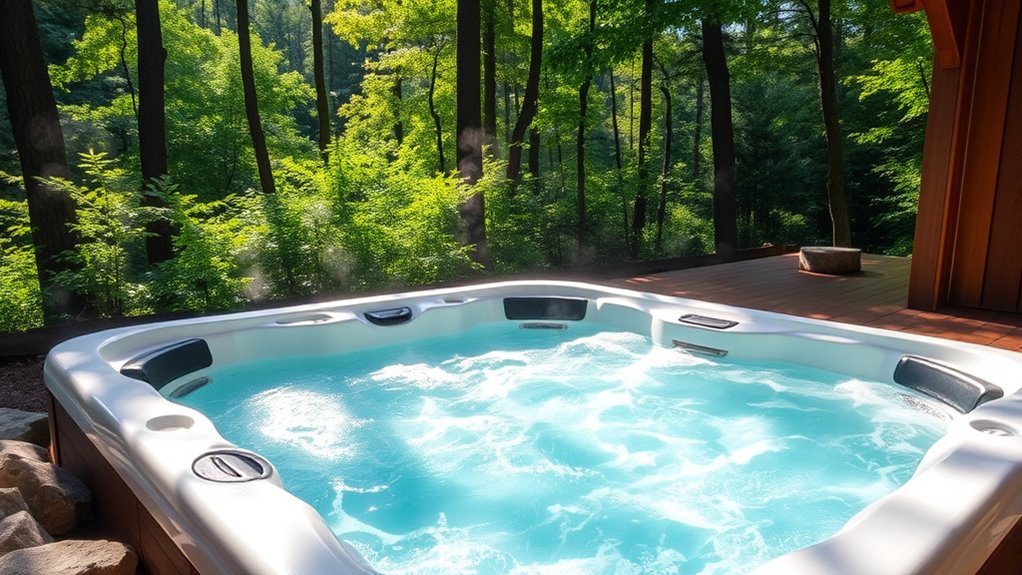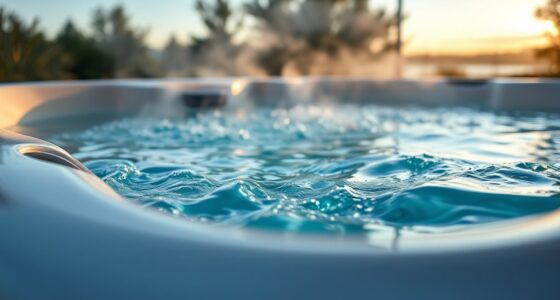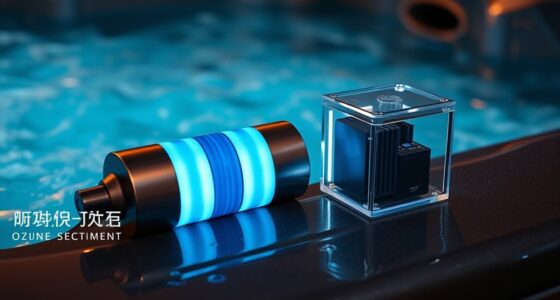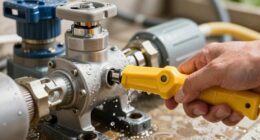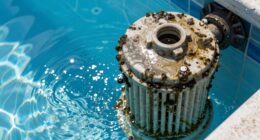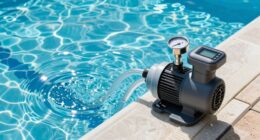Saltwater hot tubs provide a softer, more soothing soak with less skin and eye irritation compared to traditional chlorine. They use salt and electrolysis to generate sanitizer, which can extend equipment life if properly maintained. However, they may cause increased corrosion and require routine cleaning. While they offer a luxurious experience, they also involve higher upfront costs and ongoing maintenance. To better understand whether a saltwater hot tub suits your needs, explore the detailed pros and cons below.
Key Takeaways
- Saltwater systems provide a gentler, more skin-friendly experience with softer water feel and reduced irritation compared to traditional chlorine pools.
- Proper maintenance, including water chemistry balancing and equipment care, is essential to prevent corrosion and extend the lifespan of hot tub components.
- Initial costs are higher due to specialized equipment, but long-term chemical savings can reduce overall expenses.
- Saltwater may cause faster corrosion of metal parts if not properly maintained, requiring regular inspections and compatible, corrosion-resistant equipment.
- While offering a luxurious experience, some users with sensitive skin or allergies may experience irritation from salt exposure.
How Saltwater Systems Work in Hot Tubs
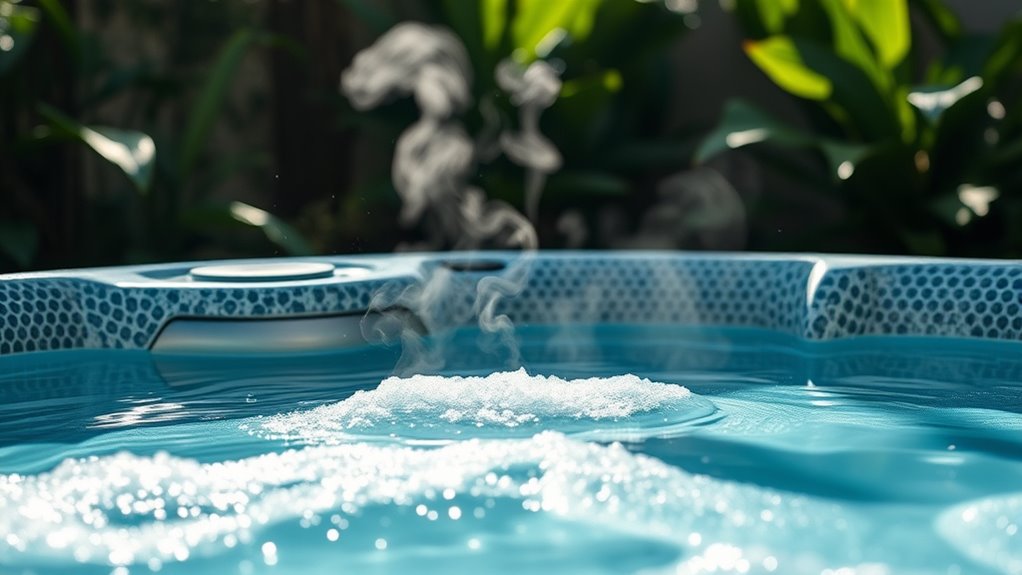
Saltwater systems in hot tubs work by generating a gentle, consistent supply of chlorine through a process called electrolysis. When you add salt to your hot tub water, the system’s cell uses electrical currents to break down the salt into sodium and chlorine ions. This reaction produces chlorine gas, which dissolves in the water and acts as a sanitizer. The amount of chlorine generated is carefully regulated, ensuring your water stays clean without the need for traditional chlorine tablets or liquid. As you use your hot tub, the system continuously produces just enough chlorine to maintain water quality. This automation simplifies maintenance, helps prevent bacteria growth, and keeps your hot tub water fresh and clear. Additionally, the effectiveness of saltwater systems depends on proper water chemistry management to ensure optimal performance. Proper balance of pH and sanitizer levels is essential for system efficiency, preventing corrosion, and the longevity of your equipment. Regular testing and adjustment of water chemistry are recommended to optimize the salt cell operation and extend its lifespan.
Benefits of Using Saltwater in Your Hot Tub
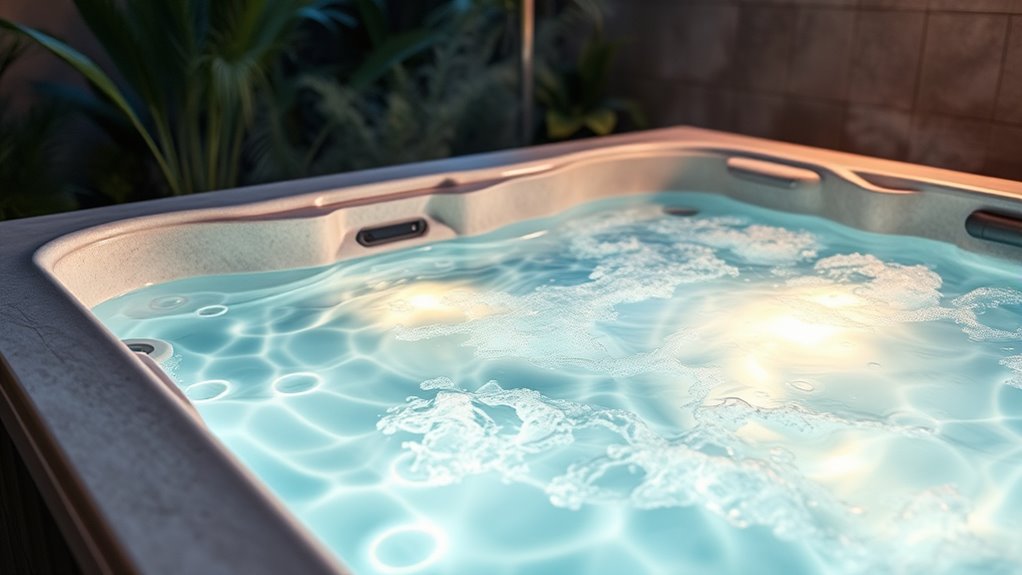
One of the main advantages of using saltwater in your hot tub is that it provides a gentler, more soothing experience for your skin and eyes. You’ll notice a softer feel compared to traditional chlorine or bromine systems, making your soak more comfortable. Saltwater also offers enhanced skin hydration, reducing dryness and irritation after use. Additionally, using salt can simplify maintenance, as the system continuously generates a natural disinfectant, lowering the need for harsh chemicals.
Here are three key benefits:
- Reduced skin and eye irritation
- Softer, more natural water feel
- Lower chemical maintenance needs
Embracing saltwater creates a more enjoyable, luxurious hot tub experience.
Potential Skin and Eye Benefits
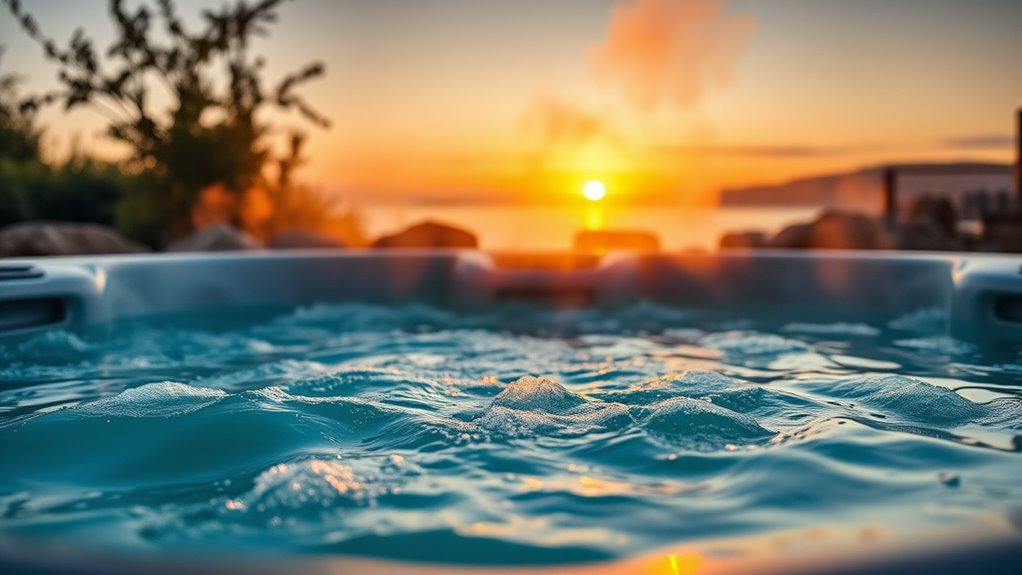
Using saltwater in your hot tub can reduce skin irritation compared to traditional chlorine pools, making your soak more comfortable. You may also notice that your eyes feel less burning and irritation during and after your soak. Additionally, saltwater systems often require less maintenance and fewer chemicals, contributing to a more eco-friendly experience. Properly managing the saltwater balance is essential to prevent potential corrosion of equipment and ensure a safe environment. Regular monitoring of water chemistry can help maintain optimal conditions and extend the lifespan of your hot tub components. Maintaining proper filtration and sanitation is crucial for preventing bacteria growth and ensuring a healthy soak. However, it’s important to observe your skin and eyes for any reactions to guarantee a safe, relaxing experience.
Skin Irritation Risks
Although saltwater hot tubs are often praised for their soothing effects, they can pose some skin irritation risks for sensitive individuals. The salt content, while milder than traditional chlorinated pools, can still cause dryness or redness. If you have sensitive skin or allergies, you might experience discomfort or irritation. To mitigate these risks, consider the following:
- Skin dryness or flaking after prolonged exposure
- Redness or itching, especially in already sensitive areas
- Potential exacerbation of existing skin conditions like eczema or dermatitis
It’s essential to monitor your skin’s response and rinse off after soaking. Using moisturizing lotions can help reduce dryness, but if irritation persists, consult a dermatologist before continued use.
Eye Comfort Advantages
Saltwater hot tubs are often favored for their gentler effects on the skin, and many users notice that their eyes experience less irritation compared to traditional chlorinated pools. The lower chemical levels help reduce redness, itchiness, and discomfort, making your soak more relaxing. Since saltwater is less harsh, your eyes stay clearer and less prone to burning or watering. You’ll find it easier to enjoy your hot tub sessions without constantly rubbing or blinking away irritation. This benefit is especially noticeable for those with sensitive eyes or allergies. Overall, saltwater systems create a more comfortable environment, allowing you to unwind without the distraction of eye discomfort. It’s a simple upgrade that can considerably improve your hot tub experience.
Maintenance and Chemical Management
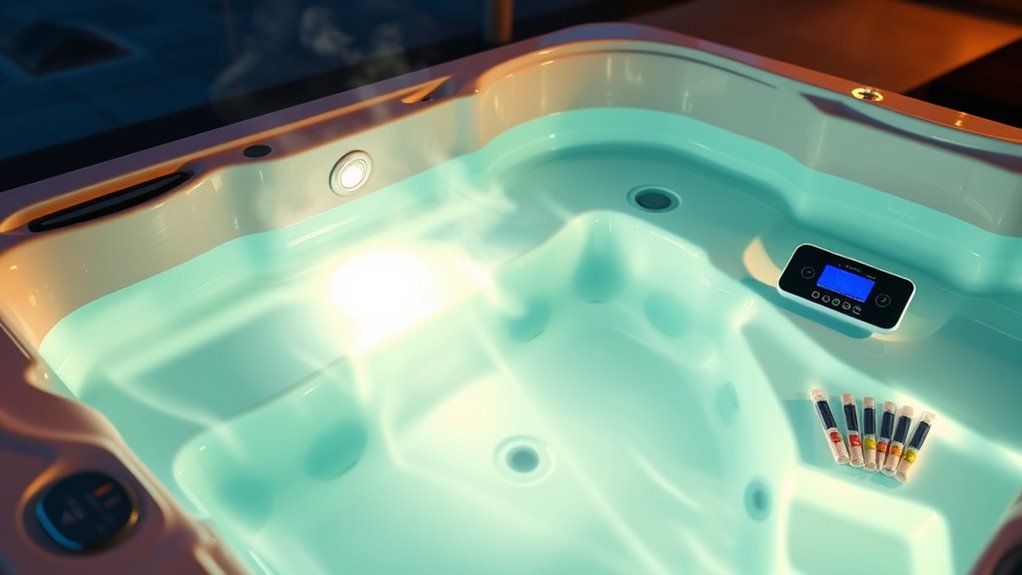
Maintaining proper water quality is essential for a safe soaking experience and to prevent issues with the saltwater system. Regular testing and balancing of the water help ensure that the salt levels and pH balance are maintained within optimal ranges. It is also beneficial to be aware of dog names that might reflect a personality or breed trait when selecting a name for your pet. Utilizing professional equipment can further improve the accuracy and consistency of water testing, ensuring optimal conditions at all times.
Water Balance Monitoring
Have you checked your hot tub’s water chemistry lately? Proper water balance is essential to keep your saltwater hot tub safe and comfortable. To maintain ideal conditions, focus on these key aspects:
- pH Levels: Keep pH between 7.2 and 7.8 to prevent skin irritation and equipment corrosion.
- Alkalinity: Maintain alkalinity around 80-120 ppm to stabilize pH and prevent fluctuations.
- Calcium Hardness: Ensure levels stay between 150-250 ppm to avoid scaling or corrosion.
Regular testing with a reliable kit helps you catch imbalances early. Adjustments should be made promptly to keep water safe, clear, and balanced. Consistent monitoring minimizes maintenance issues and prolongs your hot tub’s lifespan.
Chemical Usage Balance
Proper chemical management is crucial to ensuring your saltwater hot tub remains safe, clean, and enjoyable. You need to regularly test the water to maintain the right chemical balance, including pH, alkalinity, and sanitizer levels. Too much salt or sanitizer can cause skin irritation and damage your tub’s components, while too little can lead to bacteria growth and cloudy water. Use test strips or a digital tester to keep track of these levels, adjusting chemicals as needed. Remember, consistency is key; fluctuating levels can compromise water quality and equipment longevity. Always follow manufacturer guidelines for adding chemicals, and avoid overcorrecting, which can throw off the balance. Proper chemical usage ensures your saltwater hot tub provides a safe, soothing experience every time.
Regular Maintenance Routines
Establishing a regular maintenance routine is essential to keep your saltwater hot tub in ideal condition. Consistent upkeep ensures water quality, prolongs equipment life, and maintains comfort. To stay on top of things, consider these key tasks:
- Test and adjust water chemistry weekly, focusing on pH, alkalinity, and sanitizer levels.
- Clean the filter regularly to prevent debris buildup and maintain proper water flow.
- Inspect and monitor salt levels, topping up as necessary to ensure adequate operation.
Impact on Hot Tub Equipment and Longevity

Using saltwater in your hot tub can considerably affect its equipment and overall lifespan. The saltwater system produces chlorine through electrolysis, which is gentler on your skin but can be harsher on certain components over time. Metal parts like heaters, pumps, and jets may corrode faster if not properly maintained, especially if your hot tub isn’t built for saltwater use. Salt buildup can also cause scale formation, leading to clogs or increased wear on mechanical parts. Additionally, the salt can accelerate deterioration of seals and gaskets, potentially resulting in leaks. To preserve your hot tub’s longevity, regular inspections and using compatible equipment are essential. Proper maintenance minimizes corrosion risks and ensures your saltwater system remains efficient, extending the lifespan of your investment. Moreover, staying informed about AI Security advancements can help you adopt innovative safety and maintenance solutions for your hot tub system. Being aware of corrosion prevention techniques can further protect your equipment from salt-induced damage.
Cost Considerations for Saltwater Systems

When considering a saltwater hot tub, you’ll want to compare maintenance costs with traditional systems to see which fits your budget better. The initial investment for saltwater systems can be higher, but it may save money over time through lower chemical expenses. Understanding these cost factors helps you make an informed decision about whether a saltwater setup is right for you. Additionally, innovative materials used in saltwater systems can influence long-term durability and maintenance needs. Incorporating corrosion-resistant components can also extend the lifespan of your system and reduce repair costs over time. Proper system design can further optimize longevity and reduce ongoing upkeep, especially when aligned with best practices for preventive maintenance. Selecting components made from marine-grade materials can further enhance resistance to salt corrosion and improve system performance.
Maintenance Expenses Comparison
While saltwater hot tubs often require less chemical maintenance than traditional chlorine-based systems, their ongoing costs can still vary markedly. You’ll need to factor in several expenses that influence long-term affordability.
- Salt Replacement: Over time, you’ll need to replenish the salt, especially if you notice decreased water quality or salt levels.
- Salt Cell Maintenance: The salt cell requires periodic cleaning to prevent calcium buildup and ensure efficient operation. Replacement may be needed every few years.
- Electricity Costs: Saltwater systems typically require a control unit or generator, which can increase your energy bills compared to standard systems.
Initial Investment Requirements
Investing in a saltwater hot tub requires a higher upfront cost compared to traditional chlorine models. The initial purchase price is usually steeper because saltwater systems involve specialized equipment, like salt chlorine generators, which add to the expense. You’ll also need to factor in installation costs, including any necessary electrical work and setup adjustments. Additionally, you might spend more on accessories such as salt, which is typically sold in larger quantities. While the initial investment is higher, many owners find that the reduced chemical costs over time offset this difference. Keep in mind that ongoing maintenance expenses tend to be lower, but the initial outlay requires careful planning to guarantee it fits within your budget.
Environmental Impact and Sustainability
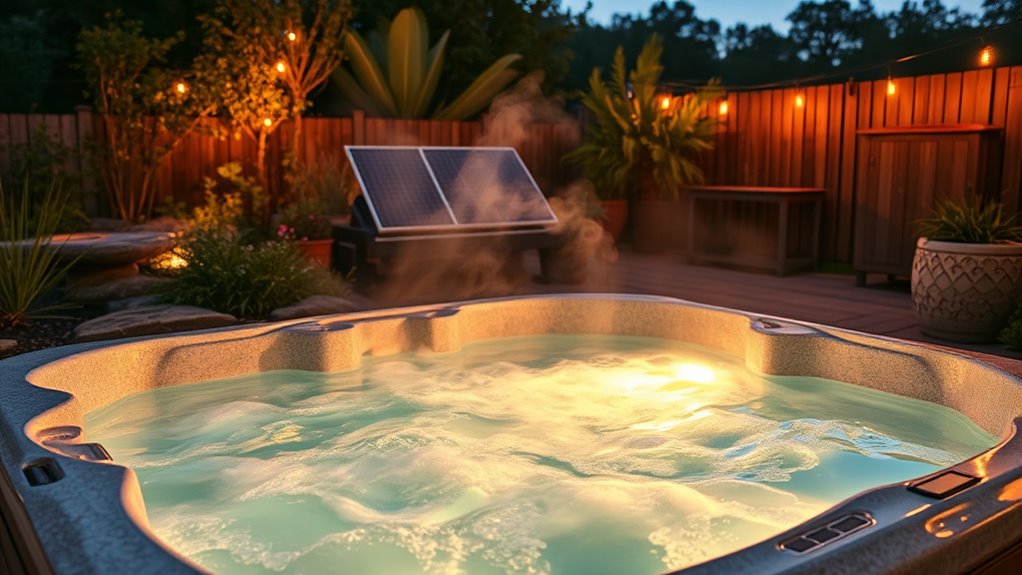
Saltwater hot tubs are often praised for their comfort and convenience, but it’s important to contemplate their environmental impact. While they may use less harsh chemicals, they still consume energy and resources. To minimize your ecological footprint, consider these factors:
- Energy consumption: Saltwater systems require electricity to operate pumps and heaters, contributing to your home’s overall energy use. Using energy-efficient equipment can significantly reduce power consumption and environmental impact. Additionally, incorporating renewable energy sources, such as solar panels, can further decrease the carbon footprint associated with hot tub operation. Employing smart controls can optimize usage times and reduce unnecessary energy consumption.
- Chemical management: Although saltwater reduces chlorine reliance, some chemicals are still needed, and their production can impact the environment.
- Water usage and maintenance: Regular water refills and filtration maintenance can lead to increased water consumption and waste. Additionally, implementing water-saving practices can help minimize water waste and promote sustainability.
- Robotics integration in manufacturing processes can improve efficiency and reduce material waste during production.
Being mindful of these aspects helps you enjoy your hot tub responsibly, balancing comfort with sustainability.
Common Challenges and Downsides
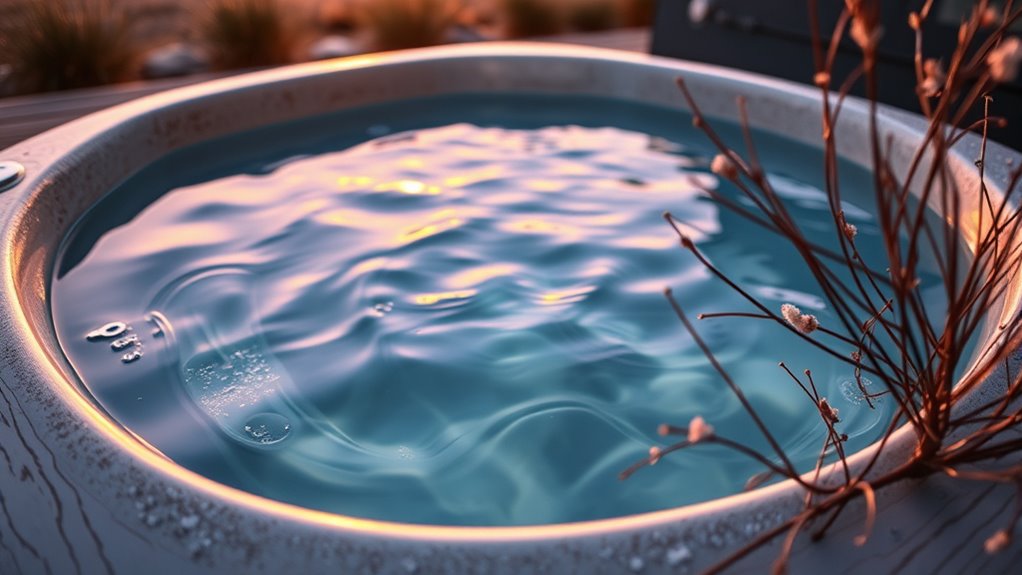
Despite their environmental benefits, saltwater hot tubs come with some notable challenges. One major issue is maintenance. Salt can corrode metal parts, pumps, and filters faster than traditional chlorinated systems, leading to higher repair costs. You might also notice a lingering salty smell that’s tough to eliminate, especially if you don’t regularly balance the water chemistry. Additionally, some people experience skin or eye irritation from the salt levels, particularly if the water isn’t properly managed. Another downside is the initial setup cost; saltwater systems tend to be more expensive to install. Over time, you may also need to replace parts more frequently due to salt corrosion. Proper water chemistry balancing is essential to prevent these issues and keep your hot tub functioning smoothly.
Safety Precautions and Usage Tips
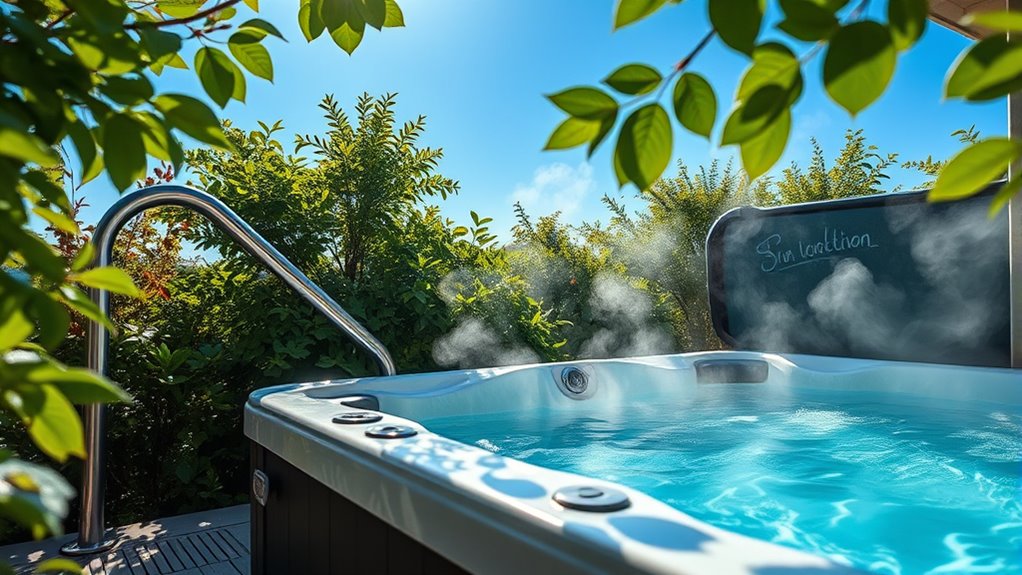
To guarantee safe and enjoyable use of your saltwater hot tub, it’s important to follow proper safety precautions and maintenance practices. First, always monitor water chemistry regularly to keep salt, pH, and sanitizer levels balanced. This prevents skin irritation and equipment damage. Second, avoid immersing yourself if you’re feeling unwell or under the influence of alcohol or medication, as the hot water can cause dizziness or dehydration. Third, keep the hot tub’s cover securely in place when not in use to prevent unauthorized access, especially by children. Additionally, maintain proper filtration and clean the system as recommended to avoid bacteria buildup. By adhering to these safety tips, you ensure your saltwater hot tub remains a safe, relaxing retreat.
Is a Saltwater Hot Tub Right for You?
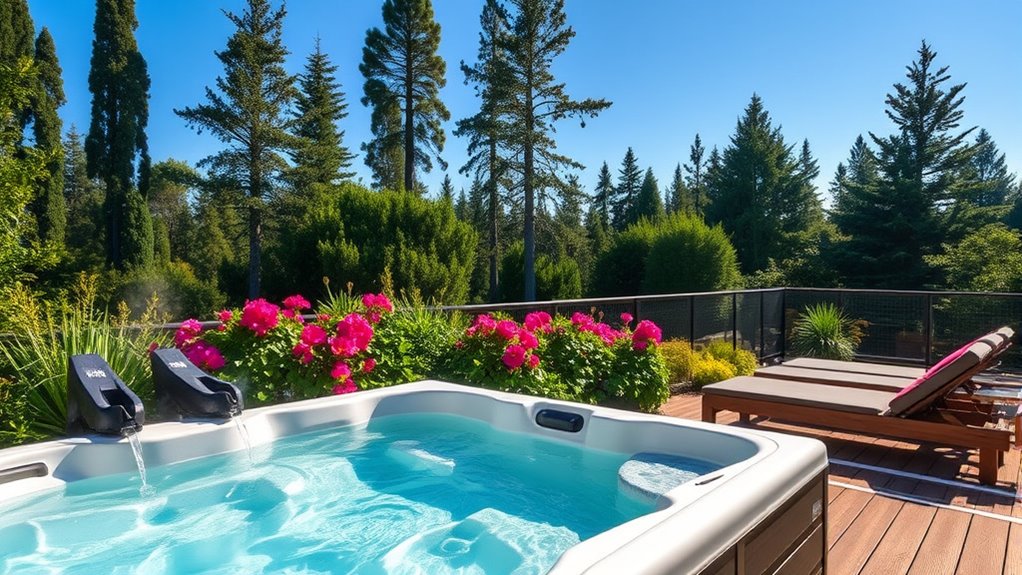
Deciding if a saltwater hot tub is right for you depends on your preferences and lifestyle. If you prefer a softer, more natural feel, saltwater offers a gentle experience. It also requires less maintenance than traditional chlorine tubs, saving you time. However, if you have sensitive skin or allergies, you might find saltwater irritating. Consider your budget, as initial setup costs can be higher, but long-term expenses may decrease. Use the table below to weigh the key factors:
| Pros | Cons |
|---|---|
| Softer water feel | Possible skin irritation |
| Lower chemical use | Higher initial cost |
| Easier maintenance | Salt may corrode equipment |
Think about what’s most important—comfort, maintenance, or cost—to decide if a saltwater hot tub suits you.
Frequently Asked Questions
How Often Do Saltwater Hot Tubs Require System Maintenance?
You might wonder how often you need to maintain your saltwater hot tub. Typically, you should check the salt levels and water chemistry weekly, especially if you use the tub frequently. Regularly cleaning the filters and inspecting the system every 1-3 months helps prevent issues. Overall, consistent maintenance guarantees your hot tub stays clean, balanced, and ready for use, keeping your experience enjoyable and hassle-free.
Are Saltwater Hot Tubs Suitable for People With Sensitive Skin?
Imagine your skin as a delicate flower, and the hot tub water as a gentle breeze. Saltwater hot tubs are often kinder to sensitive skin because they contain fewer harsh chemicals than traditional spas. You might find them soothing rather than irritating, especially if you’re prone to reactions. However, everyone’s skin reacts differently, so it’s wise to test a small patch first and consult with a dermatologist if you have severe sensitivities.
Can Saltwater Systems Be Installed in Existing Hot Tubs Easily?
You can install saltwater systems in existing hot tubs, but it’s not always straightforward. You’ll need to make certain your tub’s plumbing and electrical systems are compatible, and sometimes, upgrades or modifications are necessary. It’s best to consult with a professional to evaluate your specific setup. While it’s possible, the ease of installation depends on your hot tub’s current configuration, so be prepared for potential adjustments.
What Is the Typical Lifespan of a Saltwater Hot Tub System?
You’re wondering about the typical lifespan of a saltwater hot tub system. Generally, these systems last between 3 to 5 years, but with proper maintenance, some can go up to 7 years. Regularly replacing the salt cell, keeping the water balanced, and cleaning the system help extend its life. Keep in mind, factors like usage frequency and water quality also influence how long your system stays in good shape.
Do Saltwater Hot Tubs Have Higher Energy Costs Than Traditional Models?
They say “you get what you pay for,” and in this case, saltwater hot tubs often have higher energy costs than traditional models. You’ll use a salt chlorinator and a slightly more powerful heater, which consume more electricity. While they may save on chemicals, keep in mind that your energy bill could be higher. If energy efficiency is a priority, weigh these costs carefully before making your decision.
Conclusion
Think of a saltwater hot tub as a well-tended garden—beautiful and relaxing, but requiring attention and care. With the right maintenance, it can be your oasis of calm and health. However, neglecting its needs might turn your paradise into a thorny bush. Weigh the benefits against the challenges, and you’ll find that, like tending a garden, a saltwater hot tub rewards your effort with soothing waters and lasting enjoyment.
